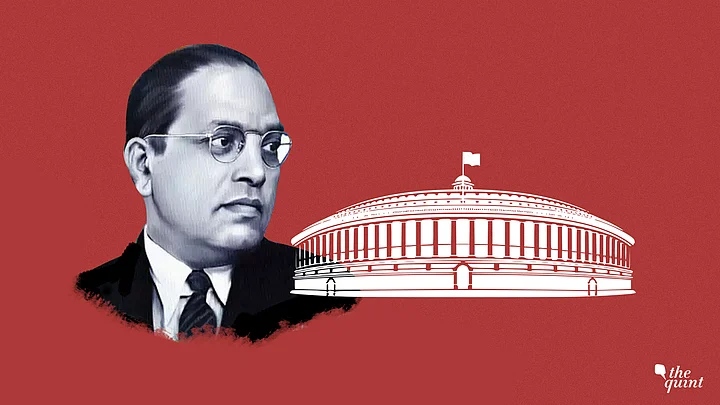(This piece was originally published on 14 April 2022. It has been republished from The Quint's archives on the occasion of Ambedkar Jayanti.)
As true seekers of democratic egalitarianism across the world remember Dr BR Ambedkar, this year, it is more crucial than ever to reimagine and revive his idea of a representative social democracy that he envisioned as a form of social organisation and not a government.
Babasaheb Ambedkar’s vision for an egalitarian democracy was rooted in his philosophical understanding of social democracy, which would annihilate caste and break through the shackles of the caste-based hierarchy of the Hindu society, a society that is bereft of ‘public spirit, public charity, morality and merit’. Dr Ambedkar, in fact, in his undelivered speech, Annihilation of Caste, wrote:
“The effect of the caste on Hindus is simply deplorable. Caste has killed the public spirit. Caste has destroyed the sense of public charity. Caste has made public opinion impossible. A Hindu’s public is his caste. His responsibility is only to his caste. His loyalty is restricted only to his caste. Virtue has become caste-ridden and morality has become caste bound. There is no sympathy for the deserving. There is no appreciation of the meritorious. There is no charity for the needy. Suffering as such calls for no response. There is charity, but it begins with the caste and ends with the caste. There is sympathy, but not for men of other castes.”
Ambedkar's Call for Separate Electorates
While Dr Ambedkar tore into the incivilities of the caste Hindu society, he thought an ideal society would be based on liberty, equality and fraternity. But his most prominent contemporary, Mahatma Gandhi, was a strong supporter of the ‘Varnashrama’ dharma and advocated for village republics, a concept rooted in ‘Ram Rajya’. He was also critical of modern civilisations in the West and preached for ‘Sarvodaya’.
Gandhi’s caste conservatism was against the liberal principles espoused by Babasaheb Ambedkar; when Ambedkar was asking for separate electorates to ensure political representation for the oppressed ‘untouchables’, the former stalled it through a threatening call for fast unto death.
Author Raja Sekhar Vundru, who has done extensive research on the history of political reservation in India, wrote, “Gandhi’s opposition to the idea of a separate electorate was that untouchables are an intrinsic part of the Hindu society.” Decades later, such caste impolitenesses of dominant caste Hindus was challenged by the Dalit Panthers movement, which, in a manifesto, gave an open call for political rule of Dalits: “We do not want a little place in Brahmin Alley. We want the rule of the whole country. Change of heart, liberal education will not end our state of exploitation. When we gather a revolutionary mass, rouse the people, out of the struggle of this giant mass will come the tidal wave of revolution ... To eradicate the injustice against Dalits, they themselves must become rulers.”
The Upper-Caste Dominated Private Sector
India, at the turn of the 1990s, implemented a massive globalisation, privatisation and liberalisation agenda to get rid of the debt crisis. But it indirectly also laid the groundwork for shrinking the public sector. After that, India saw a massive onslaught against affirmative policies put in place for the backward castes.
Since the fast-growing private sector was out of the ambit of the constitutionally guaranteed reservation policies, the sector didn’t focus on fostering a diverse workforce, as a result of which the private sector quickly became a hegemonic sphere of dominant upper castes.
Tokenistic Policies on Political Reservation
The politics over reservation in India’s political parties has been one of tokenism and has never been aimed at genuinely giving political respect to Dalits. The biggest communist party of India, the CPI(M), took 58 long years to appoint a Dalit leader in its highest decision-making body, the Politburo. The representation of Dalits in prominent places and in most prominent political parties is abysmally low. This is in stark contrast to upper-caste political leaders occupying high posts in most parties.
Political parties, without ensuring assertive representation of oppressed lower castes, cannot be expected to fully realise the representative model of democracy. Supreme Court Judge Justice Chandrachud recently pointed out, “Castelessness is a privilege that only the upper caste can afford because their caste privilege has already translated into social, political and economic capital.”
Can India Ever Accept a Caste Census?
The 75-year-long history of Indian democracy needs to do a stock-taking exercise and implement a distributive model of representation. Here, a caste census can reveal whether the democratic model of representation was ever implemented at all. It will also put to question the fierce opposition of nationalists and upper castes towards pursuing a social reform agenda.
To conclude, for Babasaheb Ambedkar the key to building a casteless democracy was ethical representation. Hence, it is imperative to destroy the existing Hindu social order and reject the Shastras. Ambedkar strongly stated:
“You cannot build anything on the foundations of caste, you cannot build up a nation, you cannot build up a morality. Anything that you will build on the foundations of caste will crack and will never be a whole.”
He also ruthlessly took on Gandhi for the latter’s utter neglect of caste justice; Ambedkar was of the firm view that believing “in the sanctity of the Shastras” can never liberate the mind.
(Subhajit Naskar is Assistant Professor, Department of International Relations, Jadavpur University, Kolkata. This is an opinion article and the views expressed are the author’s own. The Quint neither endorses nor is responsible for them.)
(At The Quint, we question everything. Play an active role in shaping our journalism by becoming a member today.)
